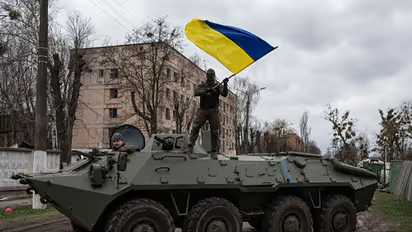History textbooks in Russia released; Laud rationale for Ukraine invasion

Synopsis
The cover of the textbook prominently features Russia's bridge connecting annexed Crimea to the mainland, serving as a symbolic representation of Putin's influence, which has been targeted multiple times during the conflict.
In a recent developments, Moscow has unveiled a fresh set of history textbooks, notable for their discourse on the significance of "demilitarisation and denazification" within Ukraine. A pivotal aspect of these textbooks is their defense of Russia's military intervention in Ukraine in September, as per reports.
In an effort to bolster its control over the narrative surrounding the conflict, Russian President Vladimir Putin has taken steps to shape the understanding of the war within the educational curriculum. This strategic maneuver seeks to present the conflict to young Russians through the lens of Moscow's historical mission.
Allegedly, the Kremlin expedited the creation of these coursebooks, tailoring them for 17-year-old students. The textbooks were officially unveiled during a press conference in Moscow.
Sergei Kravtsov, the Education Minister, highlighted the rapid compilation of the material, stressing that it was accomplished in a span of just a few months. He emphasized that the primary goal was to effectively convey the objectives underlying Russia's military incursion into Ukraine, specifically centering on "demilitarisation and de-Nazification," as enunciated by President Putin during the deployment of troops to Ukraine in the previous February.
The cover of the textbook prominently features Russia's bridge connecting annexed Crimea to the mainland, serving as a symbolic representation of Putin's influence, which has been targeted multiple times during the conflict.
Encompassing the historical timeline from 1945 to the 21st century, the book is set to be introduced in all schools by September 1. Kravtsov affirmed that the book was authored within a remarkably short span of "just under five months," and he further indicated intentions for continued supplementation after the conclusion of the ongoing military operation in Ukraine.
Presidential aide Vladimir Medinsky, recognized for his conservative historical perspectives, lauded the rapid development of the textbook. This comes in the wake of instances where certain forms of expression, such as a schoolgirl's illustration in support of Ukraine, led to contentious outcomes in Russia.
In response to the initiation of the Ukraine operation, Russian schools introduced a new subject titled "Talks on what is important," which aims to inculcate a sense of patriotism among children. This educational pivot reflects the broader strategy adopted by the government to mold the perspectives of the younger generation in alignment with its agenda.
Check the Breaking News Today and Latest News from across India and around the world. Stay updated with the latest World News and global developments from politics to economy and current affairs. Get in-depth coverage of China News, Europe News, Pakistan News, and South Asia News, along with top headlines from the UK and US. Follow expert analysis, international trends, and breaking updates from around the globe. Download the Asianet News Official App from the Android Play Store and iPhone App Store for accurate and timely news updates anytime, anywhere.